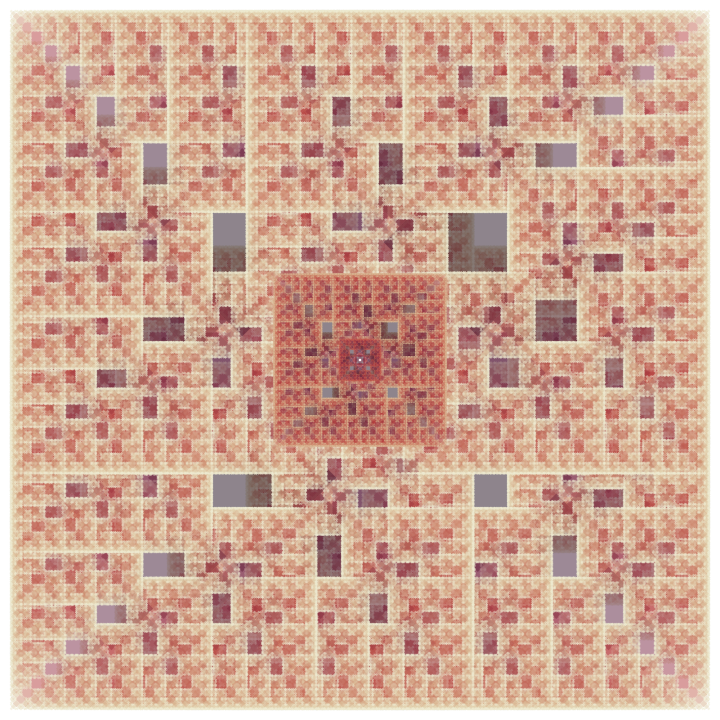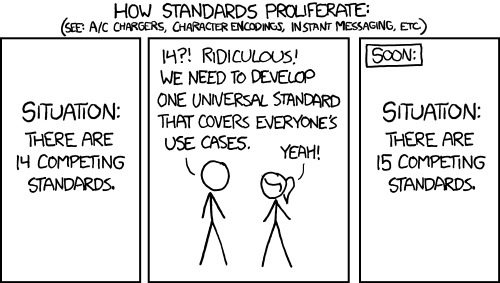There are just too many different online platforms, too many blogs, too many Facebook groups, too many forums, too many communication applications to keep tabs on. It’s ok once certain platforms are in your daily or weekly routine, but otherwise it’s easy to lose the ball and then you get out of touch with certain people. And that’s horrible, because there are so many interesting projects and people out there, but it’s hard to stay in touch with all of them. It’s only party because of the technological fragmentation, the other part is that it’s actually a problem of limited attention. You can only be in touch with a small number of things or people. Everything else just gets dropped, until it’s perhaps picked up again at an unspecified time in the future.

There has to be a better way for dealing with this issue. I’d very much embrace a technological solution that kinda aggregated all kinds of online communication platforms into one single customizable user interface. That interface would be the primary gateway to online communities. I’d like to call it Aggregator Gateway for that reason. It would collect all interesting blog posts, Facebook posts, forum posts, Tweets, mails, chat messages, and so on in a way that would be easily navigable.
There are of course partial solutions like using email as gateway by subscribing to newsletters and mailing lists. That still works relatively nicely. And this Discourse forum actually supports that kind of technology.
And then there’s RSS and Atom feeds, which kinda work for the bloggosphere, but somehow failed to become an obvious aggregation standard for everything.
Also, there’s this cool XMPP / Jabber protocol for instant messaging and related stuff, but that also failed to become a universal standard for everything web related.
It would be nice, if there was a single standard that all websites respected and used to communicate with aggregators – programs that collect all news and relevant communication across the part of the web that you subscribed to. But when you deal with Standards, you have the following problem explained in the XKCD webcomic number 927:

Could this situation be avoided? Maybe. With a user-centric approach websites wouldn’t need to adhere to uniform standards. Instead, user would use customized programs, which I call fetchers, that go out to certain websites and communication channels and fetch everything that is new. They would work like the web crawlers / spiders / robots used by search engines to scan the web for changes, but instead of working for search engines they would work for human users and fetch new content in order to integrate it into the Aggregator Gateway. That approach might cause a lot of traffic, but it would be much less dependent on universal acceptance of standards.
It’s of course possible to program fetchers on your own, but the usual internet user doesn’t have the skills required to do that. So, they would depend on used pre-made fetchers that work for some sites, but not for others. It would probably involve a lot of trial and error and a huge collection of different fetchers. Finally, websites would use standardized interfaces to make it easier for fetchers to get the newest stuff without causing unmanageable loads of traffic. Well, if they were open about allowing those kinds of bots to access their websites in that way. Facebook would probably try to block them in any way possible, because it wants humans to see the ads on that platform!
Anyway, communication channel overload is a problem that I suffer from right now, and it’s probably not getting any better in the next few years. Consolidation of different platforms would be good, if those platforms were open like Discourse, and not closed like Facebook. In fact, I’d love to have the Fractal Future Blog and the Fractal Future Wiki be integrated features of the Fractal Future Forum, rather than independent platforms, because otherwise they just contribute to the overall overload. There’s some hope that Discourse will be really suited for that purpose, since it’s a platform that is still being actively developed and improved.
Still, even if some communities consolidated all their channels into a single one like Discourse, there would still be the problem that there are different communities, which all required to log into their own version of Discourse. Theoretically this could be solved by creating some kind of meta-forum (perhaps called Discoursium) that integrated all forums in a user-defined and navigable way. Or you could simply rely on intelligent filtering of email digests, if nothing else works.
In any case, filtering is a huge problem, because there is so much stuff that people can be interested in, but scanning everything that one subscribes to at some point becomes impossible, because one simply will run out of time! This actually happened to me when I used RSS feeds. I didn’t know how to filter them effectively, so at some point I simply gave up on RSS. There’s so much I want to archive, but out of that huge amount of data I’m usually only interested in a tiny fraction of the most interesting stuff. Finding that among all the noise is difficult, and it’s becoming ever more difficult as the amount of interesting stuff published on the web is on the rise.
In the end, different individuals, organizations, and their websites compete for the attention of people. This is a fact of reality. It will never be resolved, because even when we manage to increase our capacity to process information, the sheer amount of information produced will probably increase even faster than that! And so we somehow need to deal with the situation that billions of things call for our attention, and in turn, we sometimes want the attention of billions of people (preferably the right kind of people, of course).
So, this creates a situation in which people and communication channels compete for attention. The art of drawing in attention is usually called marketing. It’s of course easy to dismiss marketing as noisy and unethical, but it’s increasingly becoming a real necessity to be able to market your stuff, even if you don’t actually want to sell anything, but just want to spread ideas, free digital goods, or want more members in an communication channel! Really good marketing looks natural and authentic. It works because it resonates with the needs of people. The best kind of marketing is viral. It turns ordinary users into evangelists and marketers who spread the world and engage others to interact with the viral thing.
This tells us something about the things that become viral: People don’t just like them, they love them so much that they want to tell everyone about them! So, having an extremely high quality product in the first place is an integral part of effective and viral marketing! This opens up the next question: What is quality? In the context of marketing it’s of course perceived quality. People must see a product as being absolutely worthwhile in order to tell others about it. Whether it conforms to formal quality standards is secondary.
Perceived quality and resonance with subjective needs are the key factors that guide attention. It’s important to be aware of that, no matter what role find yourself in: As product designer, marketer, or consumer.
What has this insight to do with the topic of communication channel overload? It explains how users adopt different communication channels. People adopt those channels that provide the highest perceived quality and resonance with subjective needs. Channels which fail at that simply won’t be adopted.
And this requires from us to understand human needs as perfectly as possible. There are of course different theoretical frameworks for that. But the most important point is really starting to think about needs – the needs of others and your own needs – and how they can match up.
Let’s start on a high level of abstraction. What do people want? People want to solve problems!
So, perhaps the right angle is to ask what problems a product or a communication channel or any kind of communication element is supposed to solve. Awareness of this question provides better orientation. And it makes it easier to decide which communication channels to adopt, and which ones to drop.
What problems brought you to this place? And how could it be made better at solving them?